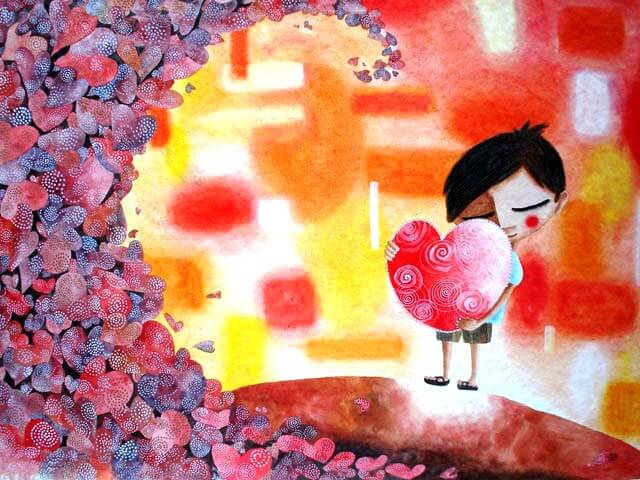Your Quality of Life Depends on What Makes You Happy

Every day we hear or read about “quality of life.” Although it is rarely ever defined clearly, they tell you that you should search for it and attain it in this way or that. The term is even associated with a “healthy life” and you get to the point of feeling bad for not being “as healthy” as you should.
The truth is that the concept of one’s “quality of life” started to become popular during the time when the idea of “total quality” took force to address industrial processes.
It was estimated that industry should produce items with the fewest possible faults and in an optimal amount of time. This is when we began to see “quality of life” spoken about to the context of human life — existence “with the fewest possible failures.”
“Eventually everything connects: people, ideas, objects. The quality of connections is the key to quality itself. “
-Charles Eames-
Thus they began to set up various outlines of ways to measure life “quality.” But what does that really mean? Is it a general concept that applies to all cases, or does each person build it individually?
Defining “quality of life”

The concept of quality of life has two dimensions: one objective and the other subjective. The objective characteristics to measure quality of life have been defined as:
- Physical well-being: good health
- Material well-being: sufficient income and solid equity
- Social welfare: good family and community relations
- Emotional well-being: self-esteem, emotional intelligence, spirituality
- Development: productivity, education
For the United Nations Development Programme (UNDP), these variables are reduced to three: life expectancy, education and income. They have developed multiple tests to measure the quality of life of people, cities and countries. They are based on the characteristics described above and others that are derived from them, such as environment, social and political environment, disability index, etc.
On the other hand is the concept of the “quality of life” that has made certain trends in psychology very successful. In these approaches the objective indicators remain relevant, but are rearranged depending on the psychological well-being of each person.
For these trends, quality of life is defined by two variables: living conditions and life satisfaction. Living conditions refer to the material aspects of existence (physical, social, functional activities or occupation). Satisfaction with life refers to the degree to which a person accepts the conditions of his or her life. In other words, it indicates how adapted they are to the life they are leading.
The individual mark on quality of life

The concept of quality of life has caused strong controversy in the world of psychology. The problem appears when you dig deeper into the variable “satisfaction with life” and the principle of “adaptation“.
Regarding satisfaction with life, we cannot say that being comfortable with one’s living conditions is always synonymous with “quality” or, in other words, mental health.
A dictator, for example, can be very comfortable with the life he leads. After all he has the voice of absolute command and maintains those around him subjected by force. However, from the point of view of emotional well-being, this does not equate to quality of life.
This satisfaction is purely narcissistic. A “fullness” that depends on the circumstances and not its constructive effort. In fact, it is an unhealthy condition that provides a temporary satisfaction, while engendering the seed of inner decay.
If we take the same example, we should also question the concept of adaptation. Whoever really adapts to a dictatorship can potentially benefit in some ways, but will also certainly pay with anxiety, fear and lack of freedom.
So how then can you define what your “quality of life” is? Perhaps the first thing that must be said is that the “quality” is an attribute that corresponds more to goods than to people. Life is a reality that is experienced and not a process that is administered.
It is also clear that there are elements that magnify and lead to the full life of a person. But those same elements can impoverish or limit the existence of a different person.
There is no “model” for life and there is no “model” human being. In a war, soldiers believe that the ideal leader is cold and full of courage. But for peace, the ideal person is one that encourages tolerance and builds harmony.
Finally, enriching your life means living according to what makes you happy and improving the lives of those around you. You do not have to be the richest, nor in the best shape, nor the one that follows their diet the best to have something that can be called a “quality of life”.

What makes your life worth living is the ability to appreciate yourself, accept yourself and avoid harm.
Have A More Meaningful Life
What meaning does my life have? Have you asked yourself that question several times before? Perhaps honestly answering it makes you a little afraid, but … See more »
Images courtesy of May Ann Licudine and Claudia Tremblay
Every day we hear or read about “quality of life.” Although it is rarely ever defined clearly, they tell you that you should search for it and attain it in this way or that. The term is even associated with a “healthy life” and you get to the point of feeling bad for not being “as healthy” as you should.
The truth is that the concept of one’s “quality of life” started to become popular during the time when the idea of “total quality” took force to address industrial processes.
It was estimated that industry should produce items with the fewest possible faults and in an optimal amount of time. This is when we began to see “quality of life” spoken about to the context of human life — existence “with the fewest possible failures.”
“Eventually everything connects: people, ideas, objects. The quality of connections is the key to quality itself. “
-Charles Eames-
Thus they began to set up various outlines of ways to measure life “quality.” But what does that really mean? Is it a general concept that applies to all cases, or does each person build it individually?
Defining “quality of life”

The concept of quality of life has two dimensions: one objective and the other subjective. The objective characteristics to measure quality of life have been defined as:
- Physical well-being: good health
- Material well-being: sufficient income and solid equity
- Social welfare: good family and community relations
- Emotional well-being: self-esteem, emotional intelligence, spirituality
- Development: productivity, education
For the United Nations Development Programme (UNDP), these variables are reduced to three: life expectancy, education and income. They have developed multiple tests to measure the quality of life of people, cities and countries. They are based on the characteristics described above and others that are derived from them, such as environment, social and political environment, disability index, etc.
On the other hand is the concept of the “quality of life” that has made certain trends in psychology very successful. In these approaches the objective indicators remain relevant, but are rearranged depending on the psychological well-being of each person.
For these trends, quality of life is defined by two variables: living conditions and life satisfaction. Living conditions refer to the material aspects of existence (physical, social, functional activities or occupation). Satisfaction with life refers to the degree to which a person accepts the conditions of his or her life. In other words, it indicates how adapted they are to the life they are leading.
The individual mark on quality of life

The concept of quality of life has caused strong controversy in the world of psychology. The problem appears when you dig deeper into the variable “satisfaction with life” and the principle of “adaptation“.
Regarding satisfaction with life, we cannot say that being comfortable with one’s living conditions is always synonymous with “quality” or, in other words, mental health.
A dictator, for example, can be very comfortable with the life he leads. After all he has the voice of absolute command and maintains those around him subjected by force. However, from the point of view of emotional well-being, this does not equate to quality of life.
This satisfaction is purely narcissistic. A “fullness” that depends on the circumstances and not its constructive effort. In fact, it is an unhealthy condition that provides a temporary satisfaction, while engendering the seed of inner decay.
If we take the same example, we should also question the concept of adaptation. Whoever really adapts to a dictatorship can potentially benefit in some ways, but will also certainly pay with anxiety, fear and lack of freedom.
So how then can you define what your “quality of life” is? Perhaps the first thing that must be said is that the “quality” is an attribute that corresponds more to goods than to people. Life is a reality that is experienced and not a process that is administered.
It is also clear that there are elements that magnify and lead to the full life of a person. But those same elements can impoverish or limit the existence of a different person.
There is no “model” for life and there is no “model” human being. In a war, soldiers believe that the ideal leader is cold and full of courage. But for peace, the ideal person is one that encourages tolerance and builds harmony.
Finally, enriching your life means living according to what makes you happy and improving the lives of those around you. You do not have to be the richest, nor in the best shape, nor the one that follows their diet the best to have something that can be called a “quality of life”.

What makes your life worth living is the ability to appreciate yourself, accept yourself and avoid harm.
Have A More Meaningful Life
What meaning does my life have? Have you asked yourself that question several times before? Perhaps honestly answering it makes you a little afraid, but … See more »
Images courtesy of May Ann Licudine and Claudia Tremblay
This text is provided for informational purposes only and does not replace consultation with a professional. If in doubt, consult your specialist.







